人教新目标(Go for it)版英语七年级下册Unit 4 Don't eat in class. 复习课件(共42张PPT)
文档属性
| 名称 | 人教新目标(Go for it)版英语七年级下册Unit 4 Don't eat in class. 复习课件(共42张PPT) | 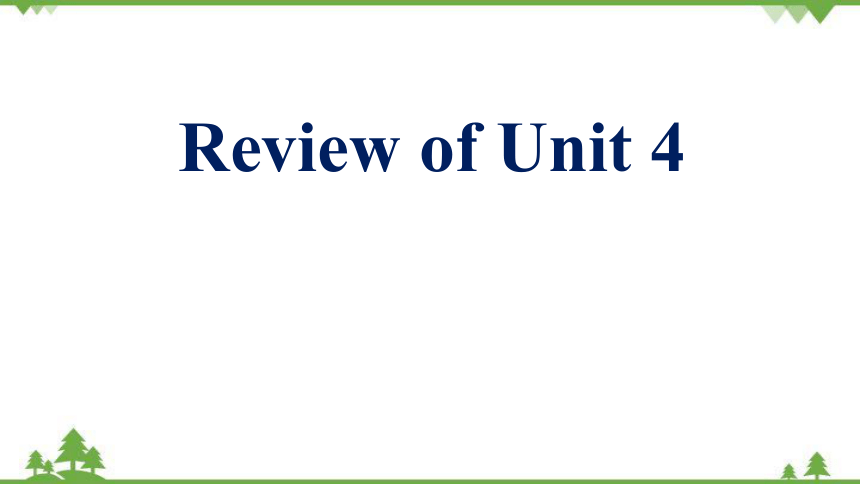 | |
| 格式 | ppt | ||
| 文件大小 | 1.1MB | ||
| 资源类型 | 教案 | ||
| 版本资源 | 人教新目标(Go for it)版 | ||
| 科目 | 英语 | ||
| 更新时间 | 2022-06-13 13:19:34 | ||
图片预览


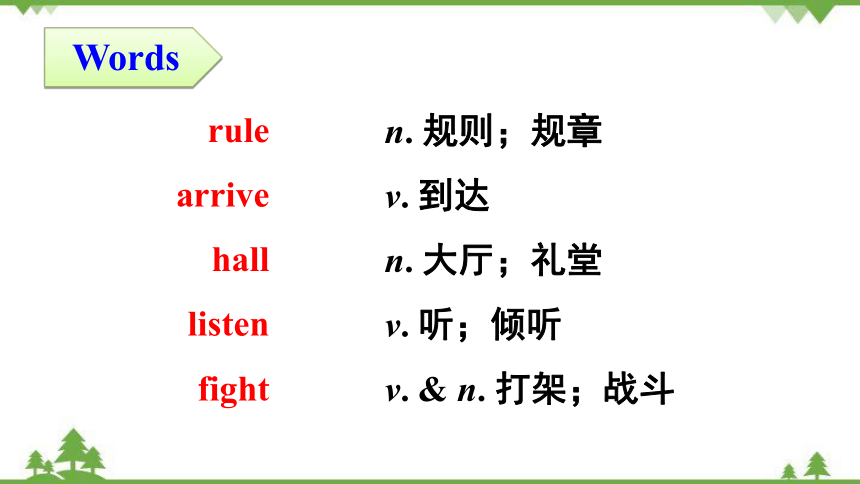
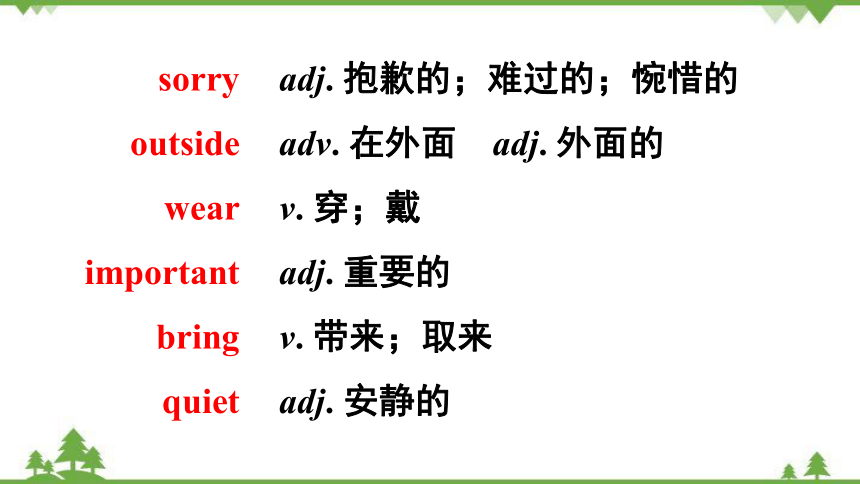
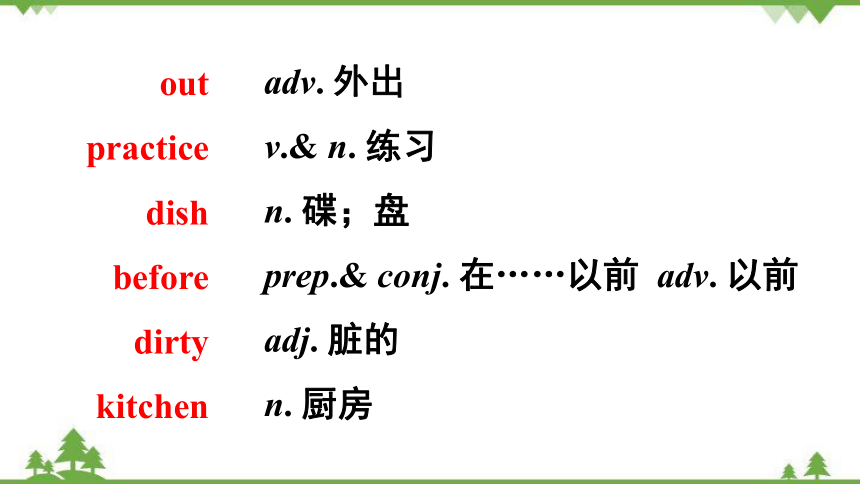
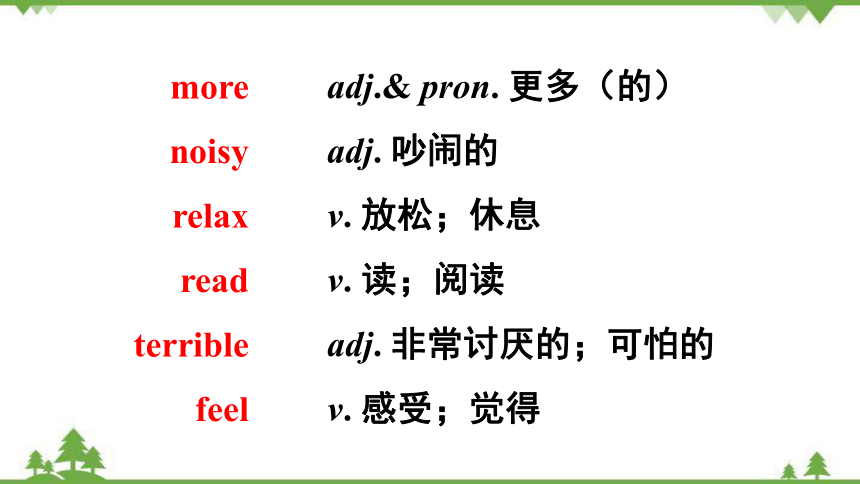
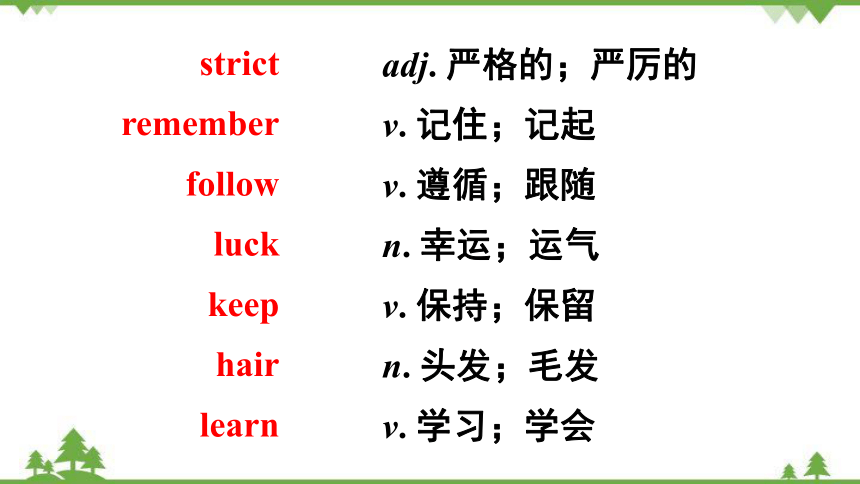
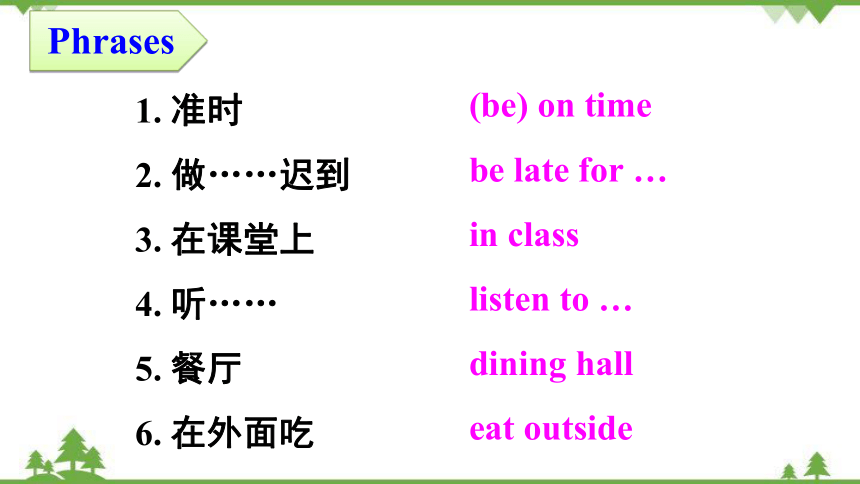
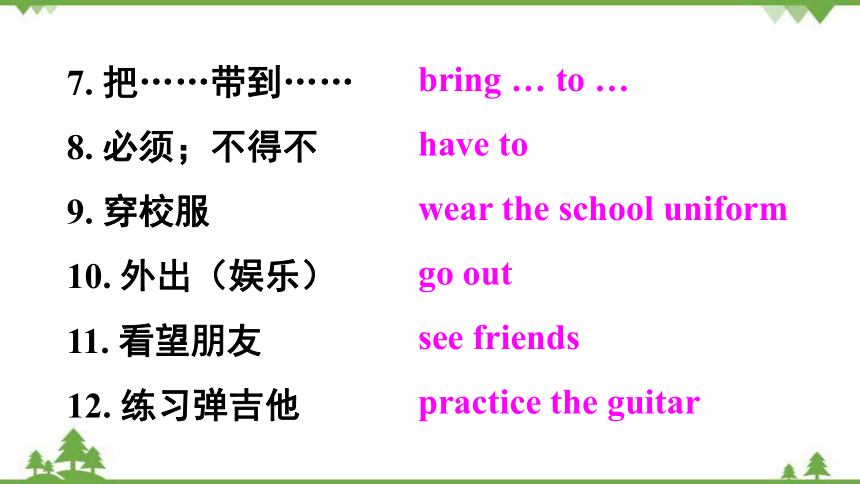
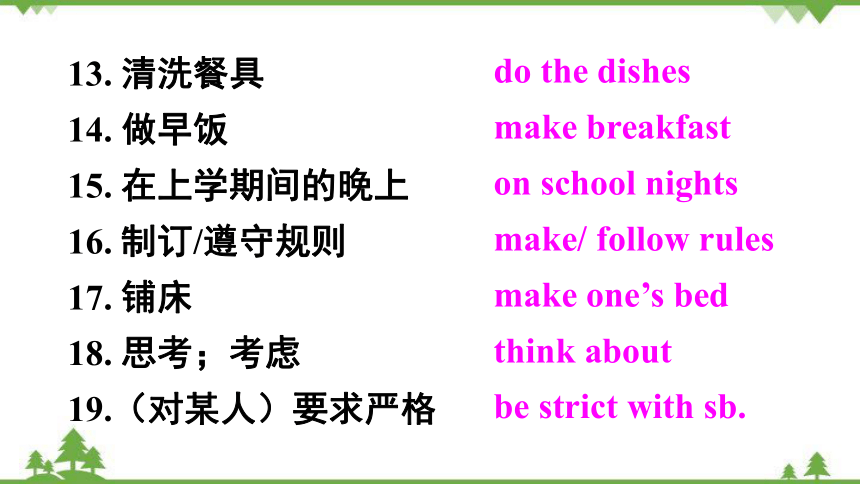
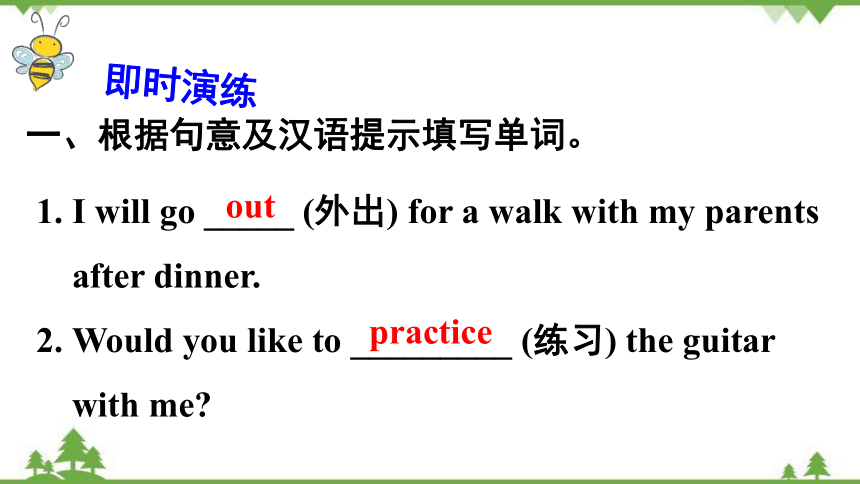
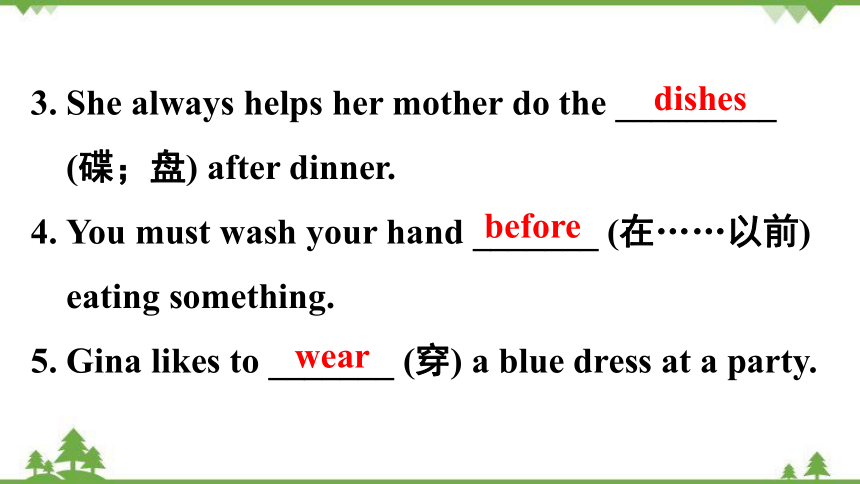
文档简介
(共42张PPT)
Review of Unit 4
单词短语
n. 规则;规章
v. 到达
n. 大厅;礼堂
v. 听;倾听
v. & n. 打架;战斗
rule
arrive
hall
listen
fight
Words
adj. 抱歉的;难过的;惋惜的
adv. 在外面 adj. 外面的
v. 穿;戴
adj. 重要的
v. 带来;取来
adj. 安静的
sorry
outside
wear
important
bring
quiet
adv. 外出
v.& n. 练习
n. 碟;盘
prep.& conj. 在……以前 adv. 以前
adj. 脏的
n. 厨房
out
practice
dish
before
dirty
kitchen
adj.& pron. 更多(的)
adj. 吵闹的
v. 放松;休息
v. 读;阅读
adj. 非常讨厌的;可怕的
v. 感受;觉得
more
noisy
relax
read
terrible
feel
adj. 严格的;严厉的
v. 记住;记起
v. 遵循;跟随
n. 幸运;运气
v. 保持;保留
n. 头发;毛发
v. 学习;学会
strict
remember
follow
luck
keep
hair
learn
(be) on time
be late for …
in class
listen to …
dining hall
eat outside
Phrases
1. 准时
2. 做……迟到
3. 在课堂上
4. 听……
5. 餐厅
6. 在外面吃
bring … to …
have to
wear the school uniform
go out
see friends
practice the guitar
7. 把……带到……
8. 必须;不得不
9. 穿校服
10. 外出(娱乐)
11. 看望朋友
12. 练习弹吉他
do the dishes
make breakfast
on school nights
make/ follow rules
make one’s bed
think about
be strict with sb.
13. 清洗餐具
14. 做早饭
15. 在上学期间的晚上
16. 制订/遵守规则
17. 铺床
18. 思考;考虑
19.(对某人)要求严格
即时演练
一、根据句意及汉语提示填写单词。
1. I will go _____ (外出) for a walk with my parents
after dinner.
2. Would you like to _________ (练习) the guitar
with me
out
practice
3. She always helps her mother do the _________
(碟;盘) after dinner.
4. You must wash your hand _______ (在……以前)
eating something.
5. Gina likes to _______ (穿) a blue dress at a party.
dishes
before
wear
6. I have many rules at school. It’s ________(可怕的).
7. My mother has to do the dishes in the _________
(厨房).
8. Please _________ (记住) to close the windows
when you leave.
terrible
kitchen
remember
9. I usually _______ (读书) books in my free time.
10. At school, we must keep our _____ (头发) short.
11. Lots of students usually eat lunch in the _______
______ (餐厅).
read
hair
dining
hall
12. There are many ______ (规章) in my school.
13. My teacher always tells me not to ______ (打架)
with my classmates.
14. It’s raining _________ (外边). Please take an
umbrella with you.
15. Look! The girl is _________ (穿着) a red coat.
rules
fight
outside
wearing
二、单项选择。
1. —Do you ______ eat in the dining hall
—Yes, we do. We can’t eat outside.
A. must B. can C. have to D. has to
2. —______ here on time, Jane. Don’t be late again.
—OK, Ms. Wang.
A. Live B. Leave C. Arrive D. Have
3. Our teachers don’t let students go out ______
school nights.
A. in B. on C. at D. of
4. Bob, dinner is ready. Please wash your hands
______ you eat.
A. because B. after C. when D. before
5. Joining clubs can ______ students lots of benefits(好处).
A. bring B. take C. sing D. make
1. 请准时到达学校!
Please get to school _____ _______.
2. 杰克每天不得不做家庭作业。
Jack _____ ____ do his homework every day.
三、根据汉语意思完成句子,每空一词。
on time
has to
3. 我们不能在教室里听音乐。
We can’t ______ ____ ______ in the classroom.
4. 我的一些朋友周末经常在外面吃饭。
Some of my friends often ___ ______ on weekends.
5. 我们现在可以外出吗?
Can we ____ _____ now
listen to music
eat outside
go out
6. 杰克每天起床后不得不整理床铺。
Jack has to _____ _____ ______ after he gets up
every day.
7. 家长们和老师们对我们非常严格。
Parents and teachers ____ ____ _____ ____ ____.
make his bed
are very strict with us
重点语法
表示请求、命令、劝说、号召、警告或建议。
主语一般为第二人称you,但通常省略。
为了使祈使句显得更委婉、有礼貌,可在开头或结尾加上please。
祈使句
句式结构
句式 肯定形式 否定形式
V型:动词原形+其他.
Wear the school uniform.
Don’t run in the hallways.
Please型:Please+动词原形+其他.
Please sit down.
Please don’t sit down.
Be型:Be+表语.
Be quiet!
Don’t be late for class!
句式 肯定形式 否定形式
No型:No+名词/动名词!
Let 型:Let+宾语+动词原形+其他.
Let’s play football.
Don’t let him play in the street.
No smoking!/ No photos!
辨析 must 和 have to
相同点:均为情态动词,它们后面都接动词原形。
不同点:must 强调说话人的主观意愿。
have to 强调说话人的客观需要。
例句:I _____ go now, or I will be late for class.
It’s too late. I _________ take a taxi.
must
have to
其他不同点:
must have to
只有一种形式,无人称和数的变化。
有人称、数和时态的变化。
否定形式为mustn’t,表示“禁止,不允许”。
否定形式为don’t have to和doesn’t have to,表示“不必”。
must have to
疑问句将 must 提至句首,其否定回答要用needn’t
或者don’t have to,不用mustn’t。
疑问句借助助动词do或does。
一、单项选择。
1. Tom, _______ the hamburgers with you! You can
have them as lunch.
A. taking B. takes C. take D. to take
2. —_______ I finish my work now
—No, you _______. You can do it later.
A. May; needn’t B. Must; don’t have to
C. Can; couldn’t
即时演练
3. —Mom, can I go dancing this evening
—_______ your homework first, and then we’ll
talk about.
A. Finish B. Finishing
C. To finish D. Finished
4. _______ fight at school, Mike.
A. Can’t B. Don’t C. Doesn’t D. Aren’t
5. Look here. _______ smoking here!
A. Not B. Don’t C. Can’t D. No
二、按要求完成句子,每空一词。
1. They have to keep quiet in class.(对画线部分
提问)
______ _____ they have to do in class
2. You mustn’t eat in the library.(改为祈使句)
_______ ______ in the library.
What do
Don’t eat
3. Can they play basketball after school
(作否定回答)
_____, they ______.
4. Jane has to take the bus to school. (改为一般
疑问句)
______ Jane _____ ____ take the bus to school
No
can’t
Does
have to
5. The boys can play chess in the afternoon.
(改为否定句)
The boys ______ _____ chess in the afternoon.
can’t play
当堂训练
1. —Tony, don’t eat ______ class.
—Sorry, I won’t do it again.
A. in B. on C. to D. by
2. —______ I swim here
—No. That’s too dangerous (危险的)!
A. Must B. Do C. Will D. Can
一、单项选择。
3. ______ late. It’s your first day to school.
A. Not be B. Don’t C. Don’t be D. Be
4. This afternoon we’ll have an English class.
Remember ______ your book.
A. to finish B. to bring
C. bringing D. taking
二、从方框中选择适当的句子完成对话。(有两项
多余)
A. What subjects(学科) do you have
B. I don’t like the rules.
C. How is the food
D. Can you have lunch at home
E. Do you have to wear uniforms
F. Where do you usually eat
G. How do you go to school
A: What do you think of your school rules
B: 1. ______
A: 2. ______
B: Yes, we do. We can’t wear other clothes.
A: 3. ______
B: In the dining hall of our school.
B
E
F
A: 4. ______
B: No. We can’t go home for lunch, and we can’t
eat outside.
A: 5. ______
B: We have Chinese, English, history, computer …
D
A
practice bed on go rule for
late feel do homework early dish
三、阅读短文,从方框中选择恰当的单词,并用其
适当形式,使短文完整、通顺。(有两项多余)
Emily has so many 1. _____ for her at home.
She has to do her 2. __________ after school. She can’t go out 3. _____ school nights. She has to do
rules
homework
on
the 4. ______ after dinner, then she can watch TV
5. _____ an hour. She likes reading. She usually
6. ______ some reading at night. She has to be in
7. ______ by ten o’clock because she has to get up
practice bed on go rule for
late feel do homework early dish
dishes
for
does
bed
Review of Unit 4
单词短语
n. 规则;规章
v. 到达
n. 大厅;礼堂
v. 听;倾听
v. & n. 打架;战斗
rule
arrive
hall
listen
fight
Words
adj. 抱歉的;难过的;惋惜的
adv. 在外面 adj. 外面的
v. 穿;戴
adj. 重要的
v. 带来;取来
adj. 安静的
sorry
outside
wear
important
bring
quiet
adv. 外出
v.& n. 练习
n. 碟;盘
prep.& conj. 在……以前 adv. 以前
adj. 脏的
n. 厨房
out
practice
dish
before
dirty
kitchen
adj.& pron. 更多(的)
adj. 吵闹的
v. 放松;休息
v. 读;阅读
adj. 非常讨厌的;可怕的
v. 感受;觉得
more
noisy
relax
read
terrible
feel
adj. 严格的;严厉的
v. 记住;记起
v. 遵循;跟随
n. 幸运;运气
v. 保持;保留
n. 头发;毛发
v. 学习;学会
strict
remember
follow
luck
keep
hair
learn
(be) on time
be late for …
in class
listen to …
dining hall
eat outside
Phrases
1. 准时
2. 做……迟到
3. 在课堂上
4. 听……
5. 餐厅
6. 在外面吃
bring … to …
have to
wear the school uniform
go out
see friends
practice the guitar
7. 把……带到……
8. 必须;不得不
9. 穿校服
10. 外出(娱乐)
11. 看望朋友
12. 练习弹吉他
do the dishes
make breakfast
on school nights
make/ follow rules
make one’s bed
think about
be strict with sb.
13. 清洗餐具
14. 做早饭
15. 在上学期间的晚上
16. 制订/遵守规则
17. 铺床
18. 思考;考虑
19.(对某人)要求严格
即时演练
一、根据句意及汉语提示填写单词。
1. I will go _____ (外出) for a walk with my parents
after dinner.
2. Would you like to _________ (练习) the guitar
with me
out
practice
3. She always helps her mother do the _________
(碟;盘) after dinner.
4. You must wash your hand _______ (在……以前)
eating something.
5. Gina likes to _______ (穿) a blue dress at a party.
dishes
before
wear
6. I have many rules at school. It’s ________(可怕的).
7. My mother has to do the dishes in the _________
(厨房).
8. Please _________ (记住) to close the windows
when you leave.
terrible
kitchen
remember
9. I usually _______ (读书) books in my free time.
10. At school, we must keep our _____ (头发) short.
11. Lots of students usually eat lunch in the _______
______ (餐厅).
read
hair
dining
hall
12. There are many ______ (规章) in my school.
13. My teacher always tells me not to ______ (打架)
with my classmates.
14. It’s raining _________ (外边). Please take an
umbrella with you.
15. Look! The girl is _________ (穿着) a red coat.
rules
fight
outside
wearing
二、单项选择。
1. —Do you ______ eat in the dining hall
—Yes, we do. We can’t eat outside.
A. must B. can C. have to D. has to
2. —______ here on time, Jane. Don’t be late again.
—OK, Ms. Wang.
A. Live B. Leave C. Arrive D. Have
3. Our teachers don’t let students go out ______
school nights.
A. in B. on C. at D. of
4. Bob, dinner is ready. Please wash your hands
______ you eat.
A. because B. after C. when D. before
5. Joining clubs can ______ students lots of benefits(好处).
A. bring B. take C. sing D. make
1. 请准时到达学校!
Please get to school _____ _______.
2. 杰克每天不得不做家庭作业。
Jack _____ ____ do his homework every day.
三、根据汉语意思完成句子,每空一词。
on time
has to
3. 我们不能在教室里听音乐。
We can’t ______ ____ ______ in the classroom.
4. 我的一些朋友周末经常在外面吃饭。
Some of my friends often ___ ______ on weekends.
5. 我们现在可以外出吗?
Can we ____ _____ now
listen to music
eat outside
go out
6. 杰克每天起床后不得不整理床铺。
Jack has to _____ _____ ______ after he gets up
every day.
7. 家长们和老师们对我们非常严格。
Parents and teachers ____ ____ _____ ____ ____.
make his bed
are very strict with us
重点语法
表示请求、命令、劝说、号召、警告或建议。
主语一般为第二人称you,但通常省略。
为了使祈使句显得更委婉、有礼貌,可在开头或结尾加上please。
祈使句
句式结构
句式 肯定形式 否定形式
V型:动词原形+其他.
Wear the school uniform.
Don’t run in the hallways.
Please型:Please+动词原形+其他.
Please sit down.
Please don’t sit down.
Be型:Be+表语.
Be quiet!
Don’t be late for class!
句式 肯定形式 否定形式
No型:No+名词/动名词!
Let 型:Let+宾语+动词原形+其他.
Let’s play football.
Don’t let him play in the street.
No smoking!/ No photos!
辨析 must 和 have to
相同点:均为情态动词,它们后面都接动词原形。
不同点:must 强调说话人的主观意愿。
have to 强调说话人的客观需要。
例句:I _____ go now, or I will be late for class.
It’s too late. I _________ take a taxi.
must
have to
其他不同点:
must have to
只有一种形式,无人称和数的变化。
有人称、数和时态的变化。
否定形式为mustn’t,表示“禁止,不允许”。
否定形式为don’t have to和doesn’t have to,表示“不必”。
must have to
疑问句将 must 提至句首,其否定回答要用needn’t
或者don’t have to,不用mustn’t。
疑问句借助助动词do或does。
一、单项选择。
1. Tom, _______ the hamburgers with you! You can
have them as lunch.
A. taking B. takes C. take D. to take
2. —_______ I finish my work now
—No, you _______. You can do it later.
A. May; needn’t B. Must; don’t have to
C. Can; couldn’t
即时演练
3. —Mom, can I go dancing this evening
—_______ your homework first, and then we’ll
talk about.
A. Finish B. Finishing
C. To finish D. Finished
4. _______ fight at school, Mike.
A. Can’t B. Don’t C. Doesn’t D. Aren’t
5. Look here. _______ smoking here!
A. Not B. Don’t C. Can’t D. No
二、按要求完成句子,每空一词。
1. They have to keep quiet in class.(对画线部分
提问)
______ _____ they have to do in class
2. You mustn’t eat in the library.(改为祈使句)
_______ ______ in the library.
What do
Don’t eat
3. Can they play basketball after school
(作否定回答)
_____, they ______.
4. Jane has to take the bus to school. (改为一般
疑问句)
______ Jane _____ ____ take the bus to school
No
can’t
Does
have to
5. The boys can play chess in the afternoon.
(改为否定句)
The boys ______ _____ chess in the afternoon.
can’t play
当堂训练
1. —Tony, don’t eat ______ class.
—Sorry, I won’t do it again.
A. in B. on C. to D. by
2. —______ I swim here
—No. That’s too dangerous (危险的)!
A. Must B. Do C. Will D. Can
一、单项选择。
3. ______ late. It’s your first day to school.
A. Not be B. Don’t C. Don’t be D. Be
4. This afternoon we’ll have an English class.
Remember ______ your book.
A. to finish B. to bring
C. bringing D. taking
二、从方框中选择适当的句子完成对话。(有两项
多余)
A. What subjects(学科) do you have
B. I don’t like the rules.
C. How is the food
D. Can you have lunch at home
E. Do you have to wear uniforms
F. Where do you usually eat
G. How do you go to school
A: What do you think of your school rules
B: 1. ______
A: 2. ______
B: Yes, we do. We can’t wear other clothes.
A: 3. ______
B: In the dining hall of our school.
B
E
F
A: 4. ______
B: No. We can’t go home for lunch, and we can’t
eat outside.
A: 5. ______
B: We have Chinese, English, history, computer …
D
A
practice bed on go rule for
late feel do homework early dish
三、阅读短文,从方框中选择恰当的单词,并用其
适当形式,使短文完整、通顺。(有两项多余)
Emily has so many 1. _____ for her at home.
She has to do her 2. __________ after school. She can’t go out 3. _____ school nights. She has to do
rules
homework
on
the 4. ______ after dinner, then she can watch TV
5. _____ an hour. She likes reading. She usually
6. ______ some reading at night. She has to be in
7. ______ by ten o’clock because she has to get up
practice bed on go rule for
late feel do homework early dish
dishes
for
does
bed
同课章节目录
- Unit 1 Can you play the guitar?
- Section A
- Section B
- Unit 2 What time do you go to school?
- Section A
- Section B
- Unit 3 How do you get to school?
- Section A
- Section B
- Unit 4 Don't eat in class.
- Section A
- Section B
- Unit 5 Why do you like pandas?
- Section A
- Section B
- Unit 6 I'm watching TV.
- Section A
- Section B
- Review of Units 1-6
- Unit 7 It's raining!
- Section A
- Section B
- Unit 8 Is there a post office near here?
- Section A
- Section B
- Unit 9 What does he look like?
- Section A
- Section B
- Unit 10 I'd like some noodles.
- Section A
- Section B
- Unit 11 How was your school trip?
- Section A
- Section B
- Unit 12 What did you do last weekend?
- Section A
- Section B
